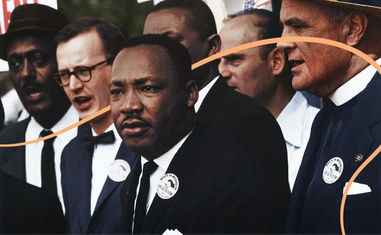The views expressed in our content reflect individual perspectives and do not represent the authoritative views of the Baha'i Faith.
When the United States celebrates Dr. King’s birthday on January 18, you’ll hear his most famous quotes: “I have a dream” and “I have been to the mountaintop.” But you probably won’t hear his most controversial speech.
That’s a pity because it may also be his most important public address. In the spring of 1967, other civil rights leaders begged Dr. King not to deliver that speech — but he ignored their advice on moral grounds and did it anyway.
That one speech, encouraged by civil rights and antiwar leader James Bevel and initially drafted by Black historian and King advisor Dr. Vincent G. Harding, had enormous repercussions. Afterward, President Lyndon Johnson, who had previously invited Dr. King to the White House, un-invited him. 168 American newspapers and magazines ran scornful anti-King editorials, calling him a traitor and a “demagogic slanderer.” Then, exactly one year to the day after the speech, Dr. King died, assassinated in Memphis.
RELATED: Let’s Use Black History Month to Learn!
His address to the nation announcing his opposition to the war in Vietnam and his support of global brotherhood shocked many of his followers in the cause of civil rights; galvanized and grew the entire peace movement, and boldly called for an end to war and the unity of all humanity. At a peace march after the speech, Dr. King said:
There are people who have come to see the moral imperative of equality, but who cannot yet see the moral imperative of world brotherhood. I would like to see the fervor of the civil-rights movement imbued into the peace movement to instill it with greater strength. And I believe everyone has a duty to be in both the civil-rights and peace movements. But for those who presently choose but one, I would hope they will finally come to see the moral roots common to both.
On April 4, 1967, the Reverend Dr. Martin Luther King Jr. delivered his powerful and now seldom seen speech titled “Beyond Vietnam: A Time to Break Silence,” at the Riverside Church in New York City. In his fiery oration, Dr. King announced that he not only opposed the war in Vietnam but all war. To stop war, he forthrightly called upon America and the world to undergo a radical transformation in human values:
A true revolution of values will soon cause us to question the fairness and justice of many of our past and present policies …. A true revolution of values will soon look uneasily on the glaring contrast of poverty and wealth …. A true revolution of values will lay hand on the world order and say of war, “This way of settling differences is not just.”
Dr. King said, “true compassion is more than flinging a coin to a beggar … it comes to see that an edifice which produces beggars needs restructuring.”
In the most surprising and stunning section of his speech that day, Dr. King brought his great oratorical skills powerfully to bear on his true topic: the oneness of humanity:
A genuine revolution of values means in the final analysis that our loyalties must become ecumenical rather than sectional. Every nation must now develop an overriding loyalty to mankind as a whole in order to preserve the best in their individual societies.
This call for a world-wide fellowship that lifts neighborly concern beyond one’s tribe, race, class and nation is in reality a call for an all-embracing and unconditional love for all men. This oft misunderstood and misinterpreted concept—so readily dismissed by the Nietzsches of the world as a weak and cowardly force—has now become an absolute necessity for the survival of man. When I speak of love I am not speaking of some sentimental and weak response. I am speaking of that force which all of the great religions have seen as the supreme unifying principle of life. Love is somehow the key that unlocks the door which leads to ultimate reality. This Hindu-Moslem-Christian-Jewish-Buddhist belief about ultimate reality is beautifully summed up in the first epistle of Saint John:
Let us love one another; for love is God and everyone that loveth is born of God and knoweth God. He that loveth not knoweth not God; for God is love. If we love one another God dwelleth in us, and his love is perfected in us.
… And if we will only make the right choice, we will be able to transform this pending cosmic elegy into a creative psalm of peace. If we will make the right choice, we will be able to transform the jangling discords of our world into a beautiful symphony of brotherhood. If we will but make the right choice, we will be able to speed up the day, all over America and all over the world, when justice will roll down like waters, and righteousness like a mighty stream.
Dr. King’s explosive, moving speech that day reverberated throughout the world. It inspired millions of people of goodwill to work for peace and justice. It gave new hope for peace to warring armies and nations and helped bring about an eventual end to an unjust war. Historians have credited that one speech with altering the course of public opinion about the war in Vietnam and ultimately helping to end it.
RELATED: I’m a Baha’i Because of Race Unity Day
Most remarkably, though, Dr. King’s “A Time to Break Silence” echoed a remarkably similar speech, a Baha’i address given by Abdu’l-Baha in that same month in that same city 55 years previously:
The oneness of the kingdom of humanity will supplant the banner of conquest, and all communities of the earth will gather under its protection. No nation with separate and restricted boundaries—such as Persia, for instance—will exist. The United States of America will be known only as a name. Germany, France, England, Turkey, Arabia—all these various nations will be welded together in unity. When the people of the future are asked, “To which nationality do you belong?” the answer will be, “To the nationality of humanity …. The people of the future will not say, “I belong to the nation of England, France or Persia”; for all of them will be citizens of a universal nationality—the one family, the one country, the one world of humanity—and then these wars, hatreds and strifes will pass away.
The body of the human world is sick. Its remedy and healing will be the oneness of the kingdom of humanity. Its life is the Most Great Peace. Its illumination and quickening is love. Its happiness is the attainment of spiritual perfections …. The divine Jerusalem has come down from heaven. The bride of Zion has appeared. The voice of the Kingdom of God has been raised.
The similar cadences, themes, and even the similar Biblical language of both of these important addresses might lead some to suspect that James Bevel, Dr. Harding, or Dr. King may have read Abdu’l-Baha’s speech and been influenced by it. That’s doubtful — but there is no doubt that Dr. King’s focus on ending racism and war faithfully echoes the major Baha’i principles. On this day, when we celebrate Dr. King’s birthday, we would do well to recognize and work for the establishment of those holy principles.
The full text of Dr. King’s speech is here.

















Comments
Sign in or create an account
Continue with Facebookor